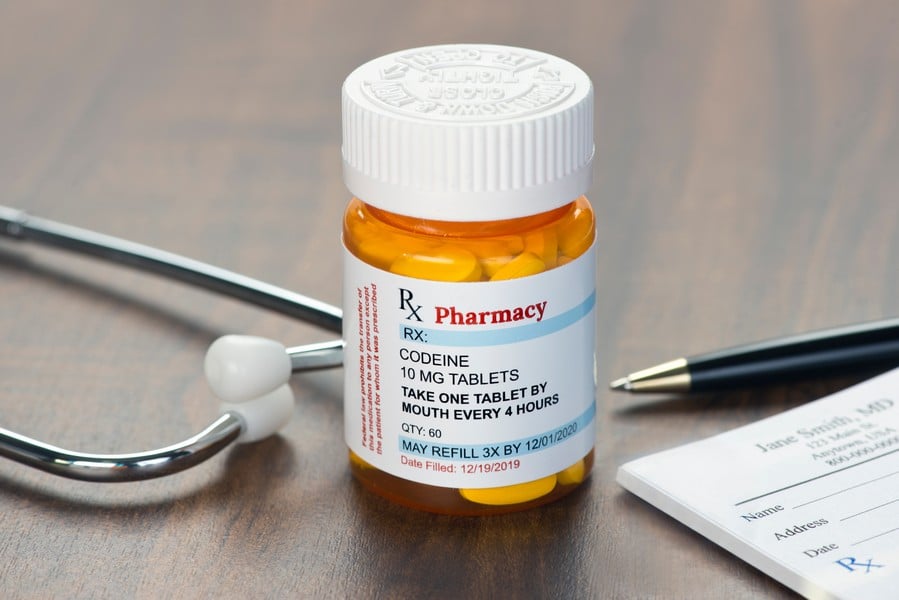What are the Long-Term Effects of Codeine Misuse and Addiction?

What is Codeine?
Codeine is an opiate medication that is used to relieve pain, coughing, and diarrhoea. It is the primary ingredient of prescription-only cough suppressants, and it is available as tablets. It is advised to use this painkiller to relieve mild to moderate pain. Opiates like codeine are potentially harmful. Codeine prescriptions may cause patients to get addicted very fast. Recurrent users of the medication may develop a tolerance to it and need higher dosages to achieve the same effects.
If escalating amounts are used repeatedly over a long period of time, an opioid use disorder may develop. When someone is struggling to stop ingesting codeine or another opiate, it’s imperative to take action.
Codeine and Brain Chemistry
Codeine is an agonist of the (mu) opioid receptor (MOR), which is a chemical that attaches to receptors in the brain or body and activates them to produce a response. Codeine is metabolised in the liver into morphine, which is 10 times more potent than codeine and does not act directly on the MOR. Because it inhibits the release of necessary neurotransmitters, codeine lowers the excitability of neurons and has a soothing effect on the central nervous system.
What is Codeine Addiction?
A person with addiction feels motivated to participate in certain rewarding behaviours while being aware of the negative consequences. Addiction is a reward system disorder. Codeine use and experiencing its effects results in a change in the concentration of specific molecules in different brain regions. These include the ventral tegmental region and the nucleus accumbens. Opiate addiction is the outcome of repeated exposure to addictive stimuli, in this case, taking codeine and experiencing its effects.
Long-term Effects of Codeine Misuse and Addiction
As a cough suppressant and pain relief, doctors often prescribe the opiate medication codeine. It may be prescribed in its pure form or in combination with other medications, including Co-codamol. However, some people decide to abuse codeine in order to experience joy and exhilaration. Codeine side effects can seriously affect a person’s relationships, income, and health when they develop an addiction.
We have examined how abusing and being addicted to codeine can have long-term negative impacts on one’s physical and mental health. We also discussed the resources that can be used to assist someone in starting their journey to recovery.
Effects of Codeine Addiction on your life
The effects of long-term codeine use on an individual can be quite detrimental in many ways. Addiction and dependence can become apparent in a short amount of time. Drug abuse has long-term effects on relationships, academic and professional goals, reputation, money, and physical and mental health, and it is frequently fatal for the addict.
Some of the more severe long-term effects of abusing codeine include:
- Acute pancreatitis
- Major depression
- Liver damage
- Kidney damage
- Uncontrollable muscle twitches
- Muscle spasms, cramps, and pain
- Loss of productivity at school or work
- Impaired social relationships
- Anxiety disorders
- Bipolar disorders
- Schizophrenia
- Depressive disorders
- Conduct disorders
- Antisocial personality disorders
- Respiratory depression
- Bradycardia
- Cold, clammy skin
- Decreased muscle tone
- Insomnia and nightmares
- Seizures
- Gastrointestinal disturbances
- Confusion or delirium
- Lethargy
Other Consequences of Long-term Codeine Abuse
Drug addiction has a terrible impact on one’s thoughts, actions, and interpersonal connections, but the long-term consequences of drugs on the body can slowly deteriorate essential systems and functions, leading to lifelong disability or even death. Even legal substances can have serious side effects that are difficult to reverse if used in excess. For some illegal drugs, lifetime harm may not even require excessive use.
Developing a dependency
When codeine is used frequently, a person may become dependent on the drug and have codeine side effects due to its addictive properties. The drug will be necessary for the person to operate both physically and psychologically, which is one of the unfortunate long-term side effects of the drug. More codeine is required as they develop tolerance from taking it frequently to stop codeine withdrawal symptoms.
Risk of overdose
The potential for opioid overdose is one of the riskiest side effects of codeine. There is a chance of overdose when taking greater amounts of codeine on a regular basis. The most frequent cause of opiate addiction-related death is respiratory failure, which can result from a codeine overdose. Codeine overdoses that do not result in death can nevertheless be quite harmful.
Despite the fact that codeine is a mild opiate in comparison to other opioids, misusing it can nevertheless result in overdose deaths. Opioids slow down the central nervous system, which controls essential functions like breathing and heartbeat. When combined with other opioids or alcohol, a codeine overdose can cause breathing to become dangerously low, which reduces the amount of oxygen the brain receives. As a result, rapid cell death happens, and the affected person may experience unconsciousness, brain damage, or even death.
Some signs of codeine overdose:
- Slow, laboured breathing
- Cold, clammy skin
- Extreme drowsiness or fatigue
- Dizziness
- Weakness
- Light-headedness
- Loss of consciousness
- Low blood pressure
- Intestinal spasms
- Muscle twitches
- Weak pulse
- Bluish lips or fingernails
Respiratory depression
Risky side effects from respiratory depression can include breathing slowly, a falling heart rate, and reduced blood pressure when high dosages of codeine are consumed.
Breakdown in quality of life
Abuse and addiction to codeine can have a negative impact on a person’s ability to function at work and at home. They may experience financial difficulties as a result of their continuous drug usage or addiction and be unable to maintain a job due to their habit.
As a person concentrates on getting the substance, relationships may also become strained. As a means of obtaining the codeine they require, they may potentially turn to criminal behaviour.
Co-Occurring Disorders: Mental Health and Codeine Addiction
Addiction and substance misuse frequently overlap with mental health issues. Mental health issues can both lead to and result from substance abuse and addiction, and there is a convoluted link between substance use disorders and mental health issues. The same holds true with codeine addiction and abuse.
People with a variety of mental conditions may feel the need or want to use drugs as self-medication or an escape from an unpleasant or harsh reality. Opioids’ numbing and uplifting effects make them especially well-liked. Some mental health issues might make it difficult to control one’s behaviour, forcing substance usage or leaving sufferers unaware of the risks involved.
Steps to take when Worried About Codeine Usage
It’s vital to know that there are many resources available if you have questions regarding your usage of codeine or are afraid that a loved one may be addicted to the substance.
You can speak with a GP or get in touch with Compare Rehab UK to get advice and information on the subsequent steps. Drug counselling and rehab can aid in your recovery from addiction.
Specialist addiction treatment
With the help of Compare Rehab UK, you can receive specialised codeine addiction treatment, which usually includes both detoxification and psychotherapy. The clinics/hospitals can provide round-the-clock care and support in a secure setting with individual rooms if inpatient treatment is required for medical detox or rehabilitation. Co-existing physical and mental health symptoms will be identified and addressed to make a recovery as safe and comfortable as possible while also lowering the risk of relapse.
The specialists are kind and caring, and they will provide high-quality therapy that may involve group, individual, and family sessions. In addition to providing aftercare and maintenance support, several of our partners can also help you find a helpful social network.
Inpatient vs Outpatient Treatment Options
The expansion of codeine addiction has led to the establishment of numerous high-quality treatment facilities throughout the UK. Comprehensive treatment organisations provide both inpatient and outpatient addiction treatments.
A typical inpatient rehab programme provides addiction treatment in a tranquil, private, and quiet atmosphere and lasts one to three months. After the detoxification and withdrawal phases, a holistic inpatient treatment programme typically includes:
- Counselling and therapy.
- Individualised food and exercise regimens.
- Other complementary approaches like yoga and wellness.
People who cannot afford the time away from their families and occupations that inpatient treatment would need may benefit from outpatient treatment, which allows patients to remain at home when not in therapy sessions.
Therapy for Codeine Addiction
The following techniques are only a few of the many that can be employed in codeine therapy:
Cognitive behavioural therapy (CBT)
Patients frequently use codeine and other pharmaceutical drugs to deal with negative emotions, stress, and trauma. While the majority of prescription drugs temporarily numb your feelings, this is a terrible tactic that promotes drug dependency. CBT is a type of therapy that focuses on your unique relapse triggers and the core causes of your addiction.
You’ll discover more effective, empowering ways to deal with socio-environmental triggers and how to manage and halt relapses. If you learn how to change these negative self-perceptions, your self-confidence and self-esteem will improve, and your risk of substance misuse will decrease.
Motivational interviewing
Motivational interviewing is a non-confrontational, patient-centred therapeutic strategy that emphasises comprehension and empathy. It’s a methodical, mannerly approach that encourages dialogue-based positive transformation. The goal is the same as it is with CBT: to improve self-perception, raise self-esteem, and change negative emotions into positive ideas, concepts, and behaviours.
Contingency management
Contingency management is a strategy for motivating addicts in recovery by rewarding them when they accomplish new objectives. If you successfully complete a drug test, lead a healthy lifestyle, or abstain for 30 days, for instance, you can be awarded coupons, cash, or awards that can be used on non-addictive products. According to the journal Psychology of Addictive Behaviours, this type of therapy enhances patients’ retention and sobriety while they are receiving addiction treatment.
Get Help For Your Addiction
For details of how Compare Rehab UK can provide you with assistance regarding Codeine addiction treatment and rehabilitation, please call 0800 999 1083 today.





